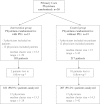Impact of information leaflets on behavior of patients with gastroenteritis or tonsillitis: a cluster randomized trial in French primary care
- PMID: 22829293
- PMCID: PMC3539030
- DOI: 10.1007/s11606-012-2164-8
Impact of information leaflets on behavior of patients with gastroenteritis or tonsillitis: a cluster randomized trial in French primary care
Abstract
Objective: To assess the impact of four patient information leaflets on patients' behavior in primary care.
Design: Cluster randomized multicenter controlled trial between November 2009 and January 2011.
Participants: French adults and children consulting a participating primary care physician and diagnosed with gastroenteritis or tonsillitis. Patients were randomized to receive patient information leaflets or not, according to the cluster randomization of their primary care physician.
Intervention: Adult patients or adults accompanying a child diagnosed with gastroenteritis or tonsillitis were informed of the study. Physicians in the intervention group gave patients an information leaflet about their condition. Two weeks after the consultation patients (or their accompanying adult) answered a telephone questionnaire on their behavior and knowledge about the condition.
Main measures: The main and secondary outcomes, mean behavior and knowledge scores respectively, were calculated from the replies to this questionnaire.
Results: Twenty-four physicians included 400 patients. Twelve patients were lost to follow-up (3 %). In the group that received the patient information leaflet, patient behavior was closer to that recommended by the guidelines than in the control group (mean behavior score 4.9 versus 4.2, p < 0.01). Knowledge was better for adults receiving the leaflet than in the control group (mean knowledge score 4.2 versus 3.6, p < 0.01). There were fewer visits for the same symptoms by household members of patients given leaflets (23.4 % vs. 56.2 %, p < 0.01).
Conclusion: Patient information leaflets given by the physician during the consultation significantly modify the patient's behavior and knowledge of the disease, compared with patients not receiving the leaflets, for the conditions studied.
Figures

References
-
- Shank JC, Murphy M, Schulte-Mowry L. Patient preferences regarding educational pamphlets in the family practice center. Fam Med. 1991;23(6):429–432. - PubMed
Publication types
MeSH terms
LinkOut - more resources
Full Text Sources
Medical

